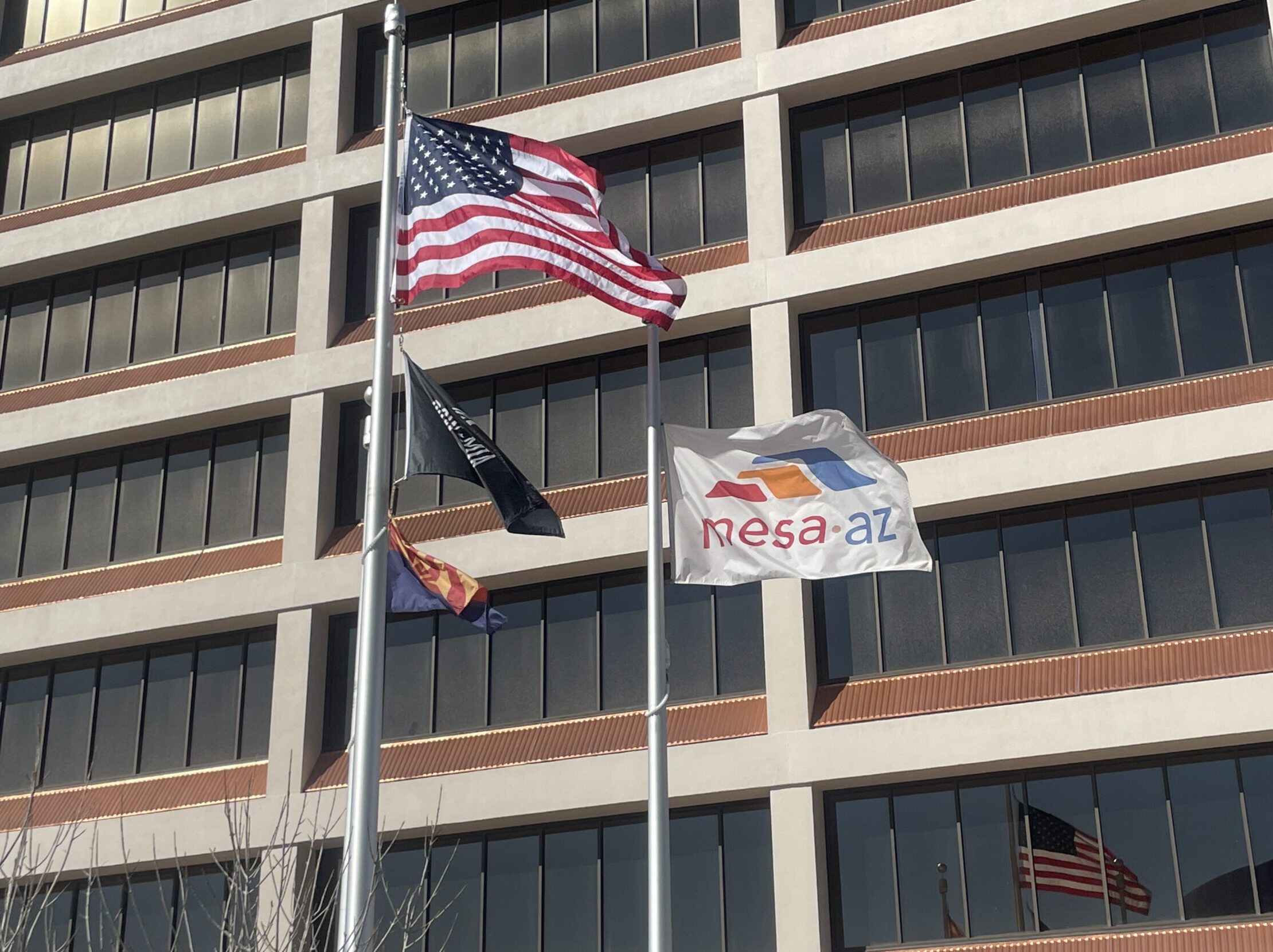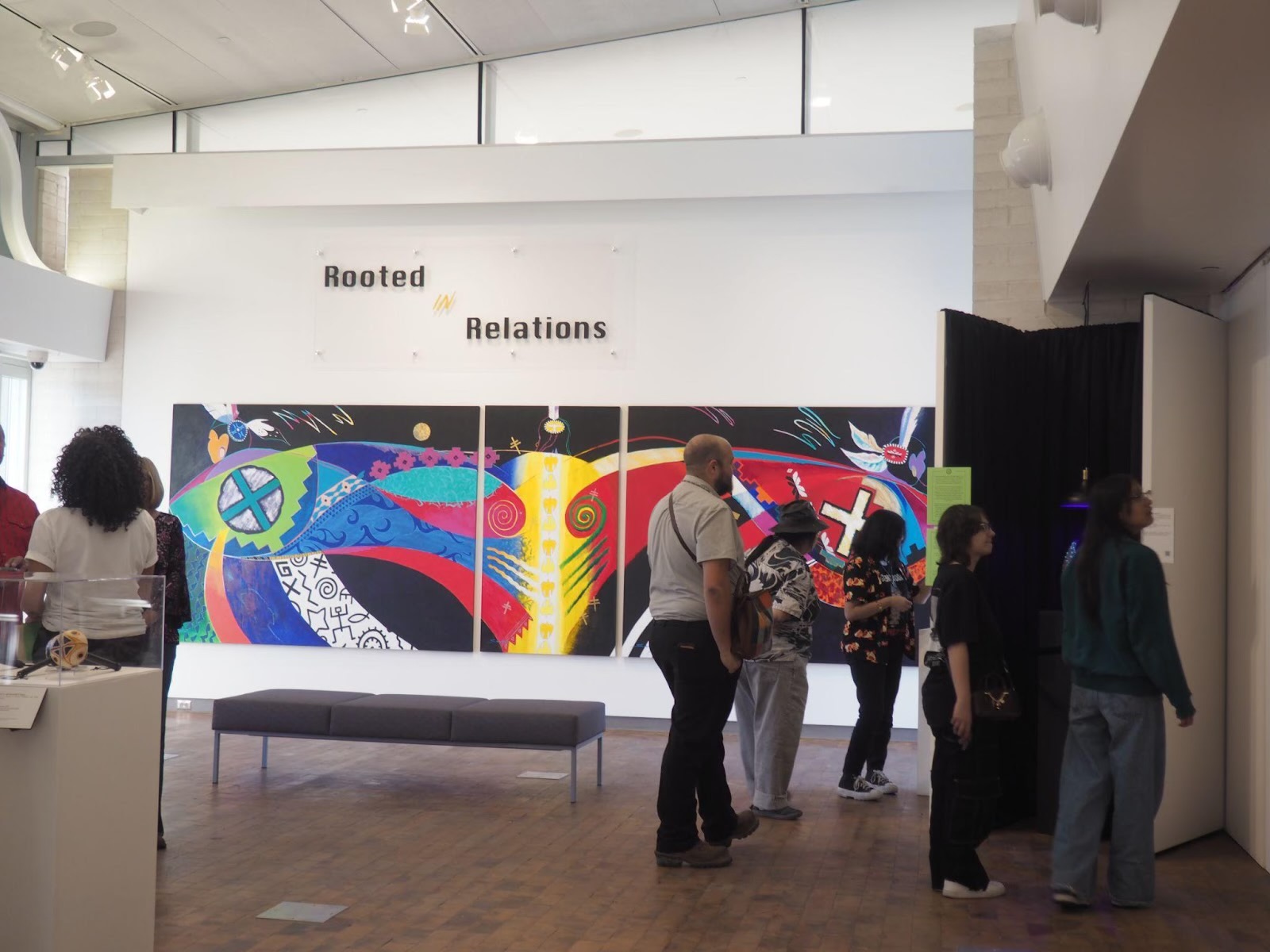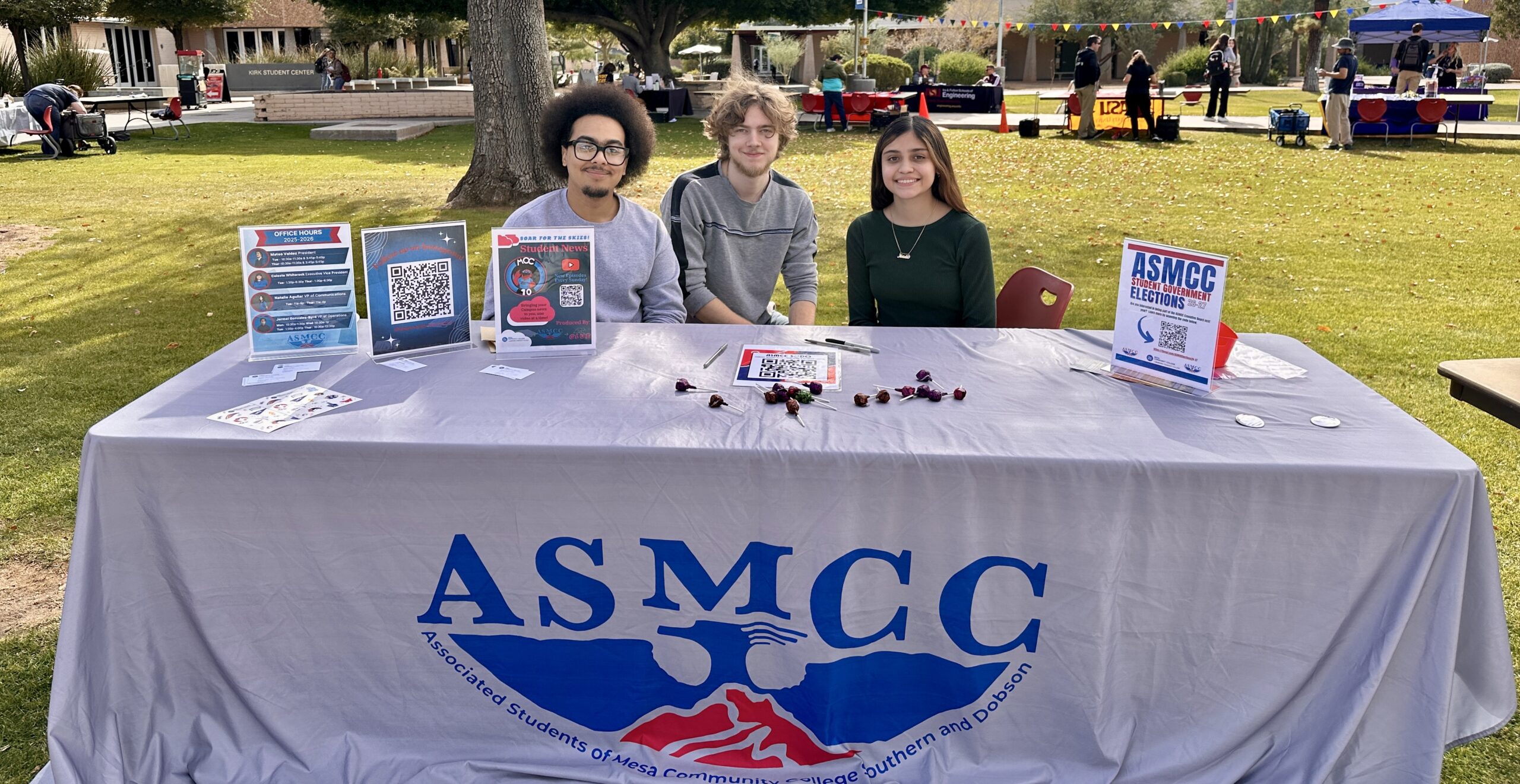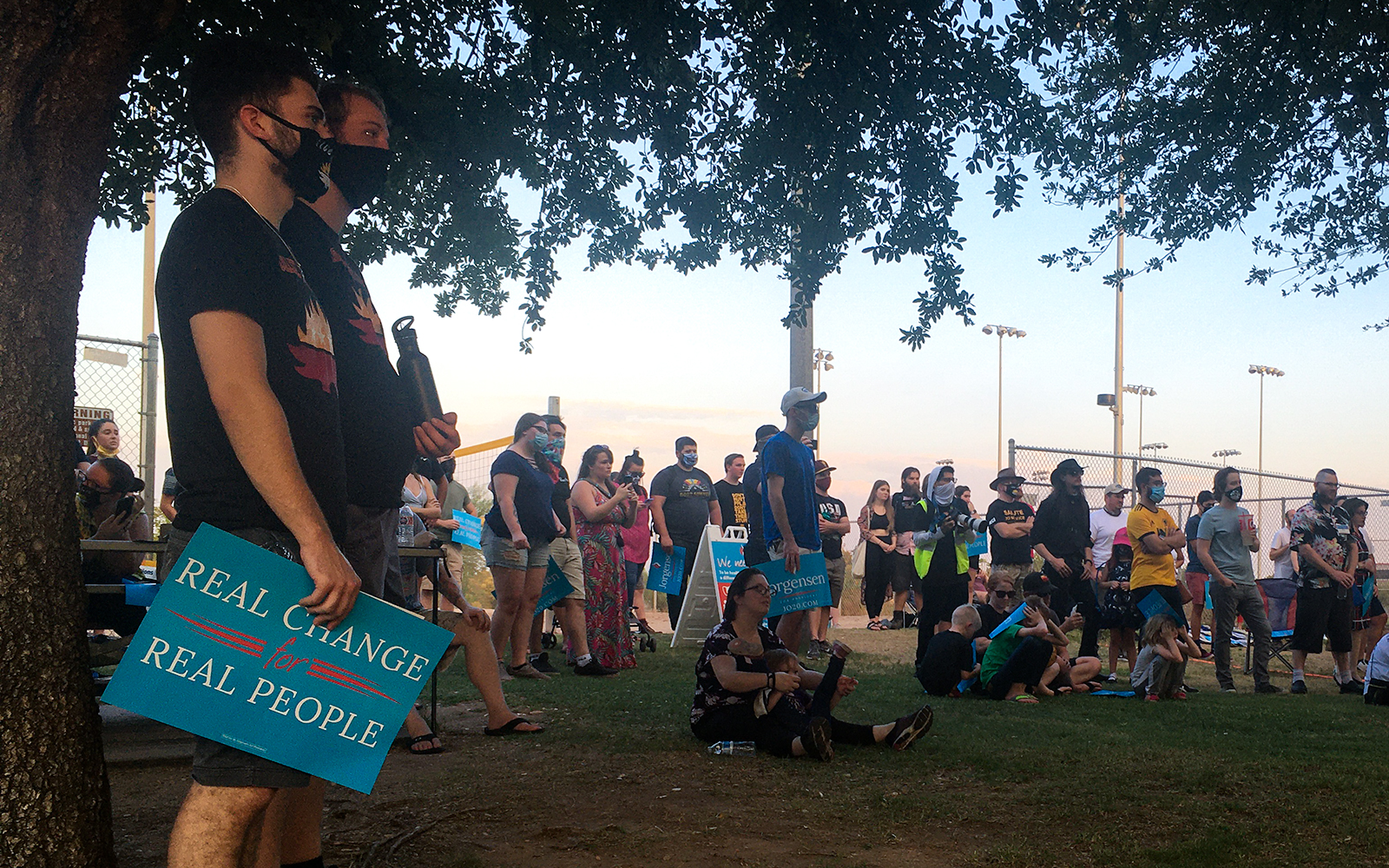The Other Candidates: Libertarian Spike Cohen makes a case for college students
As the hot Arizona sun sank on Aug. 28, the Libertarian Party’s vice presidential candidate Jeremy “Spike” Cohen pitched his, and presidential candidate’s Jo Jorgensen’s, platform to the crowd.
Families, men strapped with rifles, and Libertarians young and old attended the rally at Kiwanis Park in Tempe, Arizona. Booths advertised the Arizona Libertarian Party and handed out libertarian masks and pamphlets. “Jorgensen for president,” the slogan read. “Real change for real people.”
The Arizona State University (ASU) Libertarian Club attended, too, with masks printed with the Party’s porcupine mascot.
Emily Goldberg, the Maricopa County Libertarian Party secretary and the Arizona Libertarian Party assistant secretary and events coordinator, counted 130 attendees, 30 of whom worked the event.
“It’s a Friday in August. It’s at the end of the work week. A lot of people are tired; a lot of people are frightened indoors related to COVID…” she said, “ so from that perspective I’m really glad to see the numbers that turned out and the enthusiasm there is.”
Attendees repeated “Taxation is theft!” and listened to guest speakers. When Spike Cohen finally took the podium, they cheered as he rallied for their votes in the November 2020 presidential election.
But what exactly is the Libertarian Party platform? In a country dominated by two parties, is this an option for the disheartened? For college students? For Arizonans, who have a “culture deeply rooted in resisting federal government tyranny and including notable historical freedom fighters such as Cochise and Geronimo,” according to the rally’s press release?
There are other candidates vying for the White House. Spike Cohen makes a case for the Libertarians.
The Libertarian platform according to Cohen
Before the rally, Cohen sat down–masked up–with The Mesa Legend for an interview, wedged into the dining alcove of a tour bus plastered with Jo Jorgensen’s portrait.
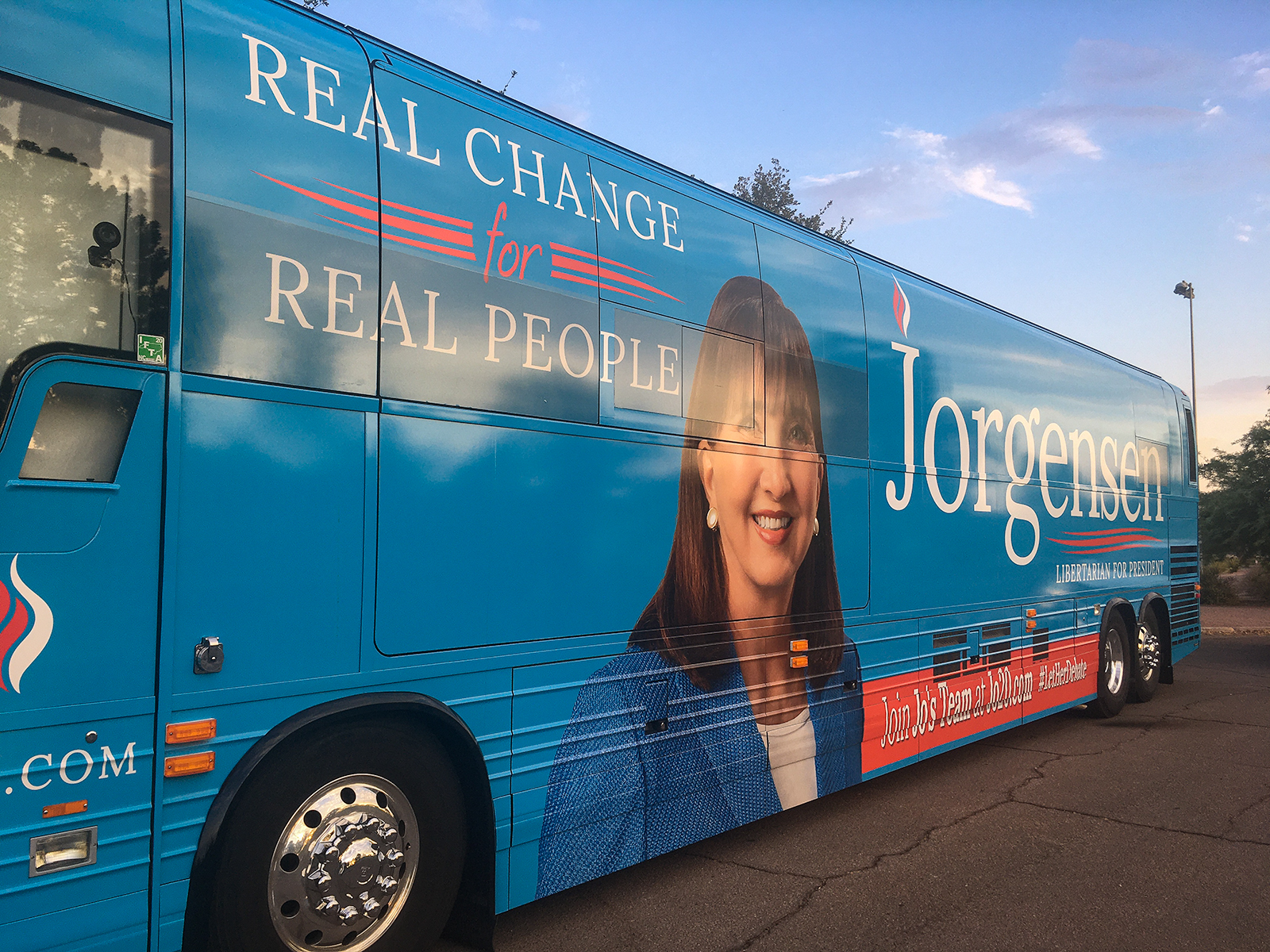
“…I’ve spoken to people across this country, and I’ve heard the same story over and over again,” Cohen said. “I’ve heard that they are not being represented by the Republicans and Democrats. They are increasingly frustrated with the fact that they feel as though they don’t have a viable other choice.
“And when I would present them the libertarian ideas–not just the party, but the actual philosophy behind libertarianism, they would have these ‘aha’ moments. And I would see hope return to their lives and to their faces.”
According to Cohen, libertarians value “the belief that you own yourself, and that you have autonomy over yourself.” Thus, you own your life, labor and property. Impeding that is a moral and economic failure.
“If you look at the harmful, oppressive, tyrannical and infringing policies of the Republicans and Democrats, it is really just a system whereby they have presumed the authority to aggress upon us and take from us whenever they see fit,” Cohen explained.
All the country’s problems–wars, healthcare, the pandemic, police brutality, the war on drugs and more–are because a handful of people have gained central control and aggress upon the public. Libertarians seek to dismantle that.
Cohen, who is Jewish and called himself a serial entrepreneur, retired from a web design business he began in his teens to promote libertarian ideas full time. He co-owns Muddied Waters Media and hosts the podcasts “My Fellow Americans,” stylized “(((My Fellow Americans))),” and “The Muddied Waters of Freedom.”
Cohen originally ran for vice president in the Libertarian 2020 primaries with Vermin Supreme, known for campaigning with a boot on his head. Their humorous and sarcastic platform included the promise of free ponies. When he placed third, he joined the general election ticket with Jo Jorgensen, a senior lecturer of psychology at Clemson University. She also ran for vice president with Harry Brown in 1996.
Libertarians want a small government and an economy regulated purely by the free market. For college students, this could be enticing.
“I’ve done talks with people on college campuses… and I’ve spoken to I don’t know how many hundreds of students, and I hear the same thing over and over again,” Cohen repeated. “…I was told if I work hard and go to college, that I’ll be able to get out and get a good job, and instead what has happened is I am now saddled with massive student debts.”
After accruing insurmountable student debt, students face “a job market that has been impeded upon by such ridiculous regulatory burden and red tape.”
Instead of governmentally centralized college policies, such as subsidized tuition, Cohen called for removing college education requirements and occupational licensing for jobs like cosmetology, as well as dismantle the Department of Education, which would eliminate federalized student loan programs.
“Because of those ridiculous burdens that have been placed, they have been put in an untenable situation. And because the government got involved and removed the price equilibrium in college, and basically told the schools they can charge whatever they wanted and they underwrite it with loans–and then force you to pay those loans even if you go bankrupt–they have created a system of inequity that has been directly at your expense as intended.”
The resentment and anxiety of impacted students is purposeful; it helps the government sell you on further control over your life. Cohen’s eliminations would hand power back to students to finish school earlier, start jobs earlier and live without crushing student loans.
The Libertarian platform also covers police brutality and individual freedoms. Cohen decried qualified immunity and police involvement in “every aspect of our lives thanks to the war on drugs, and the war on sex, and the war on guns and the war on income.” He stated police should be held accountable and fulfill the role of protecting lives, rights and property, not police every aspect of citizens’ lives. During the rally, he read off a list of people killed by the Phoenix police in the last two years.
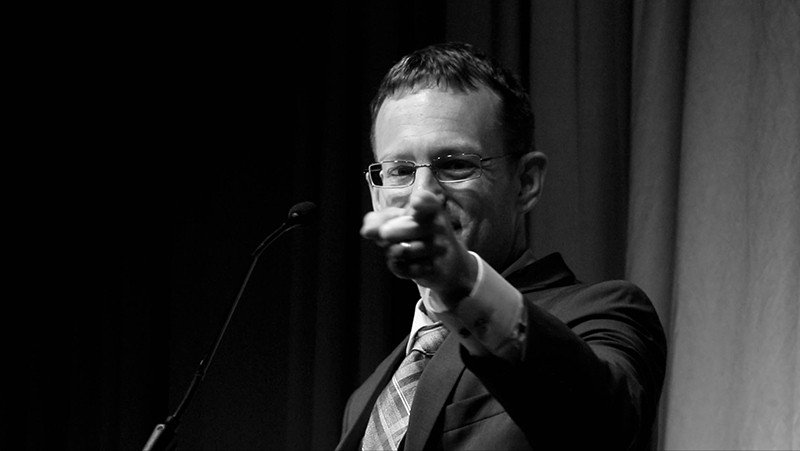
“[Qualified immunity] … allows abusive government officials and police officers to do what they wish without fear of civil liability as a result of it.”
Cohen also supported a pathway to citizenship for peaceful undocumented immigrants, like DACA recipients.
But when asked about that aforementioned line in the press release–how a Libertarian platform of American values can be compared to a genocide of Native Americans and indigenous values–Cohen said, “…Any harm that has been done in a large scale like a genocide to a small scale like just a bad interaction between police and the public, it is a situation in which that powerful people are imposing themselves onto people with less power simply because they can, and because they’re not respecting the autonomy of those people.”
With all that said, do Libertarians have a real shot when two parties dominate?
“We have a very subversive plan to take votes away from Donald Trump and Joe Biden so they both lose, and Jo Jorgensen wins and is elected to the White House,” Cohen said. “…We are often framed as election spoilers… [major media and government] want to present the narrative that you only have two choices, and they’re both terrible, and you simply have to suck it up and vote for them, or else you’re gonna get that other terrible choice.
“At some point we have to say that voting for lesser evil just leads to evil, and the next step is to stop voting for evil and to start voting for people who actually have policies that will dismantle the oppression that’s happened from both Republicans and Democrats working together the past several decades.”
He explained their campaign is serious, and Americans, especially the marginalized, don’t have to live with abuse, oppression and tyranny. This goes double in the “unmitigated disaster” of a pandemic, with a government “who tests no one, who treats no one, who cures no one, who acted to actively stop and hamper the actions of those who actually do test and treat patients and medical professionals.”
The Libertarian platform according to a political science professor
Mesa Community College (MCC) political science professor Brian Dille explained libertarianism like so: Americans value freedom, order and equality, but they conflict. Conservatives value order over freedom and freedom over equality, liberals value equality over freedom and freedom over order, and “a libertarian comes down on the side of freedom every single time.”
The party is a minority view. Dille explained each major party has a Libertarian wing, as they are fiscally conservative and socially liberal. The Republican libertarian wing is more powerful.
“… A true Libertarian wants government out of everything. That means they want it out of the economy, which makes conservatives happy, but they also want government out of private lives, which conservatives aren’t too keen on, and that’s what makes liberals happy.”
However, keeping the government out of everyone’s lives maybe isn’t all it’s cracked up to be.
“Is it possible to have a completely free market? The answer is yes. That’s probably not the place you want to live,” Dille explained. “There’s no regulations to speak of, so business does whatever business wants to do as far as hiring, firing, pollution. There’s no worker safety; there’s no consumer protection… There is just the market.”
Libertarians are on board. The logic is if a business has bad practices, people will punish it by buying elsewhere, but that typically doesn’t happen. People go with the cheapest product.
“… If you believe that people are individualistic atoms who don’t live in families or communities, then a perfect libertarianism makes sense. Because everyone does whatever the heck they want to do with no limitations on individual freedom. But if you believe that humans are social animals that interact in societies and communities, and that those communities have interests as well as individuals, well, then you might believe you might want to have some regulations, some restrictions, some rules that have to be followed.”
Dille pointed to African countries with powerless governments as what a libertarian paradise might look like. No regulations, no government to enforce what little regulations there might be, no public schools or hospitals. An army and a police station, which libertarians like, but life expectancy and quality of living are low, while business practices are rapacious.
Whether this is your paradise depends on your ideology, but students might not benefit.
Dille explained the Libertarian argument is student loans and pell grants paid for by the government have allowed colleges to increase fees. If colleges are cut off, they would reduce tuition or shutter. But the argument has a serious flaw.
“That may or may not be a good thing, but the reason they’re going out of business is because no one can afford to go to college anymore… What their solution to student debt is, is to just have people stop going to college if they can’t afford to pay for it out of pocket.”
College would be out of reach for a larger part of society, particularly the economically marginalized. In a modern society driven by information, lacking tools, innovation and education is a setback. The student loan system is broken and prices are inflated, but dismantling the Department of Education is not a cure-all.

“I do not think [students] would benefit, because students go to school, and those schools by and large are subsidized by their neighbors,” Dille said.
That subsidization, funded by taxes, is often decried by Libertarians with the mantra “taxation is theft” coined by Ayn Rand. Libertarians say government forces taxpayers, sometimes violently, to fund organizations. Dille refuted. A healthy community has requirements to function, such as paved roads, healthcare for seniors and public school. Taxes are dues to be functional.
“I’m happy to pay my dues to be part of that club, whereas a Libertarian doesn’t see themselves as part of the club… There’s a logical connection behind that phrase, but to believe that is to completely ignore the fact that you live in a community.”
Dille also said the party winning is impossible. Libertarians run to spread their message, but they are somewhere between 6 to 8% of the population–not nearly enough to win.
However, he wasn’t worried about third party votes spoiling an election. While it has happened, Libertarian voters are both Republicans and Democrats.
“… I admire their integrity. That they continue to vote their conscience, even though it’s a hopeless cause,” Dille said.
The Libertarian platform according to voters
Even in a pandemic in sweltering weather, the rally welcomed Cohen’s appearance. They believe libertarianism is right for Arizona and college students.
Goldberg believes the separation of undocumented families, occupational licensing, and how the state handles the 22 sovereign nations within Arizona are problems of Draconian federal policy.
“We have a spirit of freedom here that is Cochise, Geronimo, Barry Goldwater, Sandra Day O’Conner, that I think is alive among Arizonans, especially young Arizonans,” she said. “And I don’t think that those young Arizonans listening to the two major parties feel like those speak to them.”
The ASU Libertarians Club members agreed. Club President Morgan Fox said Jorgensen’s campaign and her Black Lives Matter support solidified his vote.
“I don’t think anyone likes the fact that they have to choose between two authoritarian parties. I see a lot of people I know talk about settling for Biden… People say the same thing about Trump… Well, there’s a third option, and that third option supports a lot of the things that people want,” Fox explained.
Fellow member David Howman nodded. “A lot of younger people, especially college students, are very much in favor of things like Black Lives Matter and talking about racial equality, and those are things that the Libertarian party, specifically Jo and Spike, have both been very passionate about.”
Ending qualified immunity, the cash bail system, civil asset forfeiture, the war on drugs–all reasons the two are voting for what they call an accessible and subversive platform.
“I think more than ever, [college students are] looking to actually get out there and vote, and it’s just a matter of showing them that there is somewhere they can vote for instead of voting against,” Howman said.
Levi, who would not give his last name, carried an FN FAL rifle owned by his friend. He was part of a group who called themselves security, though they were not officially hired.
“I hate taxes. I like machine guns,” he said. “… I don’t like that we’ve been stuck in this little game of literal cat and mouse for a hundred years with the Republicans and Democrat politicians. It’s same shit, different day…quite frankly, I got sick of it.”
Cohen mentioned that, out of the regular protestors, the several men carrying rifles he referred to as the “boog bois” were one of his favorite groups. Boog bois refers to the boogaloo movement, a primarily libertarian group. According to the Southern Poverty Law Center, the group “…emerged concurrently in antigovernment and white power online spaces in the early 2010s.” A few members “are interested in aligning with Black Lives Matter or antifascist protesters against police brutality.”
“Anyone who thinks that guns are dangerous inherently in the hands of private citizens, I encourage them to come out to my rallies,” said Cohen. “…There’s been a completely peaceful thing. There have been children and pets. It’s been like a cookout, and it’s been perfectly fine.”
Brandon, who also didn’t give a last name and whom Levi called boss, said, “Be who you are. Taxation is theft. Yeah, just living life. Being who you are. That’s about it.”
Cohen left the podium after a Q&A, and attendees beelined to take pictures or donate as night fell. Jorgensen’s tour bus portrait overlooked.
Dille explained libertarians value individual liberties, freedoms and autonomy above all else, despite the potential chaos. From a dramatically reduced government to ending qualified immunity, college students can choose whether the Libertarian platform is right for them. Cohen said yes. Dille said no.
“Education is a public good…It’s in our society’s interest to educate our poorest people, because they are going to build businesses and industries that don’t exist right now,” explained Dille.
And for Libertarians, fixing college education means cutting government support altogether.
“We can take the power back,” said Cohen. “And we can organize in a market and a people set free in a far better way than can be done on our behalf with some top-down, arbitrarily defined set policies. That’s what I’m running on, is to let people know they can have their power back, and we can take it back from the cronies and the politicians and bureaucrats who took it from us.”
Corrected on Sept. 22: An earlier version of this article mistakenly quoted Cohen to have said “boot boys” instead of “boog bois.” The article has been updated to reflect the correct quote, “boog bois.” Jo Jorgensen’s name was also corrected from the misspelling Jo Jorgenson.
